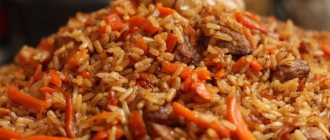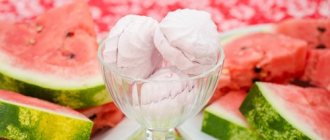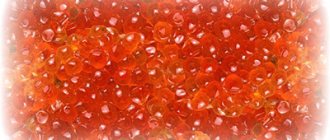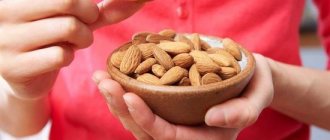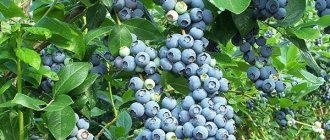Benefit
Breastfeeding (BF) is an important period in the life of every woman. Fears of harming the baby during this period are especially great, so young mothers are forced to carefully plan their diet.
A nursing mother should receive enough vitamins and nutrients so that both she and the baby have enough. This point is especially relevant in the very first months of breastfeeding, since the main part of the baby’s nutrition during this period is breast milk. The diet of a nursing woman should contain the maximum amount of products containing the elements necessary for the proper development of the baby. You need ingredients such as meat, cereals, and, of course, vegetables, fruits and berries.
As for gooseberries, the vitamins and minerals contained in them are beneficial for anyone, even a healthy body. In addition, it is a good replacement for medications and biological additives created on the basis of chemistry. It contains vitamins A, B, C and E, as well as iron, calcium and magnesium, phosphorus and a number of other important substances. In addition, the berry is recognized as dietary, since its calorie content is very small.
Dietary recipes for blackberry dishes for a nursing mother
The berry is good to add to yogurt, porridge, jelly. You can make juice, but dilute it half with water before drinking.
Banana and blackberry smoothie. In a blender, mix 1 banana, blackberries (200 g), milk (1 l), sugar (100 g). Pour the mixture into bowls. Place in the refrigerator for 5 minutes to cool.
Cottage cheese with blackberries. Add egg (1 pc.) and flour (100 g) to fresh cottage cheese (200 g). Stir everything. Crush the blackberries, drain the resulting juice, add sugar to taste. Mix cottage cheese and blackberries. Bake like regular cheesecakes, covered.
Blackberry smoothie - a delicious treat for a young mother
Medicinal properties
Gooseberries are indicated for consumption by expectant mothers as a source of substances valuable for the body. Experts also recommend using it during lactation. However, this does not mean that the product can be abused. Everything should be in moderation, because excess can cause allergies and harm the baby.
When breastfeeding, it is very important to gradually add new foods to your diet.
An exhausted body must be replenished with nutrients over time and return to normal. The benefits of gooseberries during this period are undeniable; many factors contribute to this.
First of all, the berry puts in order the disturbed metabolism. This gives strength to the body and tidies up the young mother’s figure. But gooseberries also normalize the functioning of the nervous system. The serotonin contained in the berry acts as an antidepressant; mixing with honey especially enhances its effect. This may be relevant if a woman is showing signs of postpartum depression.
A common problem for pregnant women and nursing mothers is low hemoglobin levels. Eating gooseberries brings it back to normal and prevents the appearance of anemia. The berry also helps improve blood circulation, which is an important point for both the woman and the baby. In addition, it helps remove excess fluid from the body, which provides protection against edema.
It is not uncommon for a baby to suffer from colic. In this case, doctors often advise including gooseberries in the mother’s diet. It normalizes the functioning of the gastrointestinal tract and, when supplied to the baby along with breast milk, relieves him of this problem. In addition, a mild laxative effect will help eliminate the problem of constipation and rid the body of harmful substances and toxins. In the first months of a baby’s life, it is very important to maintain the condition of his immune system, which is also facilitated by the use of this useful product.
Breastfeeding deals a rather strong blow to the female body, which is weakened during pregnancy. This often affects the condition of the teeth. In addition, the child also needs elements responsible for the formation of baby teeth, which he can receive mainly from mother's milk. Eating gooseberries also contributes to this.
The berry should be eaten in order to prevent cancer, pathologies of the kidneys and other organs. In addition, the adverse effects of colds will also not become a problem if mommy consumes gooseberries in recommended doses.
Breastfeeding is an important process for the formation of a child’s body, and therefore young mothers should carefully monitor their diet. For example, red fruits and berries are prohibited, as they can cause allergies. Although some types of gooseberries have a similar shade, it is a rare exception and is absolutely harmless. In addition, when the baby gets older, experts recommend using this particular berry as the first complementary food.
One of the most frequently asked questions is whether mothers should eat berries fresh during lactation, or is it better to cook various dishes with its addition. Experts agree that gooseberries that have not undergone any processing are the most useful, but compotes and jams based on them will also not hurt.
You need to start using this product carefully - with a few berries.
Next, you need to observe the child’s reaction, and if no problems are identified, the daily portion can be increased to 300 grams.
A woman who has recently become a mother should be attentive not only to the baby’s health, but also to eat right. In this case, the child will grow and develop healthy. When it comes to proper nutrition, you can often hear: “Can a nursing mother eat gooseberries?” This berry has a number of positive and negative qualities that you should familiarize yourself with before eating it.
When is it recommended to introduce fruits and berries into a nursing mother’s diet and how to do it correctly
Any new foods, including berries and fruits, should be introduced into the mother’s diet gradually. A child’s body, which receives beneficial nutritional components from breast milk, is most vulnerable in the first weeks of life, which is why during this period the mother should pay special attention to the correct choice of food products. Thus, fruits that cause bloating (for example, plums) are recommended to be slowly added to maternal nutrition only after the first month of breastfeeding . All fruits that have red or orange colors and shades in their skin color include pomegranates, cherries, sea buckthorn, grapefruits, tangerines, and so on are also at risk for a baby. These fruits and berries can also be introduced after four weeks of feeding, while not forgetting to carefully record the occurrence or absence of any reactions to the new product in the baby.
In the first days after the birth of a child, a breastfeeding mother is recommended to:
- green apples (help improve intestinal function thanks to pectin, satisfy hunger and improve mood);
- pears (remove toxic substances from the body due to the large amount of fiber);
- peaches (help quench thirst and activate lactation processes in the mother’s body).
It is important to note that fruits and berries are useful to eat not only fresh. Moreover, some experts believe that during lactation it is much healthier to eat fruits that have undergone heat treatment in order to avoid problems with the gastrointestinal tract in the baby . Some of these delicious and healing dishes include, for example, the following:
- green apples baked in the oven;
- marmalade, marshmallows and other sweets made from fresh fruits without added sugar;
- mousses, casseroles, purees prepared with the addition of cottage cheese;
- homemade jam and marmalade (in limited quantities);
- homemade freshly squeezed and freshly brewed compotes, juices and fruit drinks.
Table: optimal mode of introducing fruits and berries into the diet of a nursing mother
Chokeberry fruits can be consumed during lactation only if the expectant mother was already well acquainted with them during pregnancy. Red rowan fruits are not recommended for consumption during lactation.
Photo gallery: fruits and berries recommended for consumption, as well as their benefits for mother and child
Video: what berries and fruits can nursing mothers eat?
Proper nutrition
When feeding a baby with breast milk, a woman's diet should be quite varied. With it, the child receives a sufficient amount of vitamins and minerals for proper development. It is important to exclude from the diet those foods that can cause an allergic reaction. You should also avoid eating foods that cause intestinal spasms. Many people are interested in whether a nursing mother can have gooseberries? Fruits, vegetables and berries are a source of benefits from mother's milk. Children under one year of age must be supplied with all necessary substances in sufficient quantities. This can only be ensured with a balanced diet, so a woman must carefully think through all her meals.
Gooseberries are a tasty and healthy berry that contains several groups of vitamins. It does not cause negative reactions in the newborn's stomach. Its advantage also lies in the absence of coloring pigments, which often cause allergies.
Gooseberries are a source of magnesium, which is necessary for the body of mother and child. It participates in the life of every cell and restores the acid-base balance in the mouth. That is why berries should be included in the diet of every woman who has recently given birth.
During breastfeeding, gooseberries, like any other product, should be introduced gradually into a woman’s diet. Even the healthiest berries can cause allergies after childbirth. To begin with, eat five pieces and monitor the baby’s body’s reaction for two days. After this, the rate can be increased.
A maximum of three hundred grams per day is allowed. In this case, you can get the maximum benefit and not harm the baby’s body.
Seasonal fruits are the best option
Modern agriculture has reached such heights that any vegetables and fruits can be found on store shelves even in winter.
Despite the appetizing appearance and apparent safety, a woman should think about which fruits are healthier - those growing in their season or grown at an unusual time of year.
Agree that February cherries, strawberries or raspberries should alert you. Perhaps these berries are quite edible, but they were clearly brought from afar, which is why they were treated with chemicals. There is no need to expose the infant's body to a possible eating disorder.
The seasonality of fruits is an important condition for the safe nutrition of a nursing woman. It is no secret that each fruit and berry (cherry, gooseberry, peach) has its own ripening period. Accordingly, ripened vegetables or fruits are as healthy and tasty as possible.
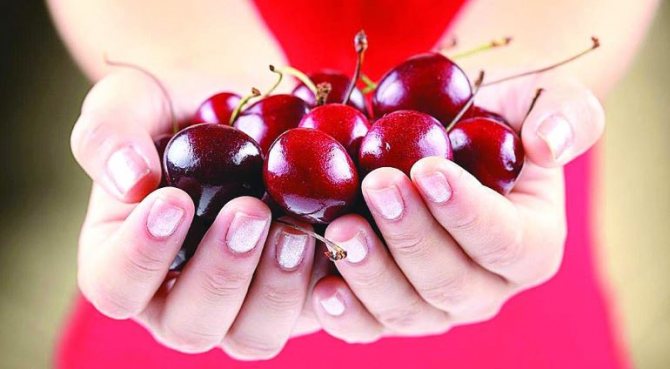
We offer a list of the best fruits for nursing mothers and infants according to their ripening period:
- White and yellow cherries are on our shelves from late spring to August. Cherries of similar colors are allowed immediately after the baby is born. Cherries are valued for their rich vitamin and mineral composition - they contain vitamins A, P, C, Mg and Fe. Cherries can be eaten raw or cooked into a delicious compote. It is better to eat red cherries after the child reaches three months of age.
- Currants ripen in mid-summer and have a huge supply of ascorbic acid. Unfortunately, this is an allergenic product. Only after three months can a woman drink red or black currant juice, and only then (in the absence of a negative reaction) is she allowed to eat the berry itself.
- Nectarine - usually ripens in mid-summer. Nectarine is valued for its ability to improve metabolism due to its silicon content. Consumption is acceptable from birth, but you need to monitor how the baby reacts to nectarine.
- Cherry is perhaps the most common berry crop in our country; it ripens in July. Cherry, like its relative the sweet cherry, contains ingredients that help strengthen blood vessels, lower blood pressure (in the mother), and increase the baby’s defense system. It is recommended to eat cherries approximately a month after the baby is born (or earlier is possible). For the first time, cherries are eaten during the day to track children's reactions - insomnia, allergies, diarrhea. If your health does not change, cherries can be added to your diet.
- Gooseberry - a delicious berry ripens by the end of July. This product improves digestion and appetite, but you still need to understand whether a nursing mother can eat gooseberries. Experts assure that it is even necessary, since the magnesium contained in it strengthens a woman’s gums and teeth, and is also passed on to the baby through milk, maintaining his health.
Beneficial features
Berry is a dietary food product that consists of the following components:
- vitamins C, A, B;
- mineral components;
- useful microelements;
- malic, citric and folic acid;
- flavonoids;
- tannins.
If you choose dark gooseberries, they additionally help remove harmful salts and metals from the body
The properties of the berry are ensured due to the high content of pectin. P-active compounds are used to strengthen capillary walls. Gooseberries are used to prevent the development of cardiovascular diseases.
The body of a nursing woman is very susceptible to external influences. Gooseberries affect him only on the positive side. It is not recommended to eat it only if you have problems with the gastrointestinal tract. For diseases such as ulcers or colitis. You should first consult your doctor if you have kidney or urinary tract diseases.
How to use
How to eat berries:
- Fresh blackberries are healthy; the calorie content of the product is only 34 kcal. Do not forget to wash the fruits under running water, and for mothers who are breastfeeding, it is better to additionally pour boiling water over them.
- You can freeze the berries for the winter, but the energy value will double.
- It is good to drink blackberry juice, diluting it with a small amount of boiled water.
- If raspberries or currants are already present in the diet, blackberries can be alternated with them.
After heat treatment, the fruits do not completely lose their valuable qualities, so they are used to make jelly and compotes. Blackberries are added to yoghurts, kefir, and baked goods. The berries are also tasty in jams and preserves, but eating them is not recommended, as excess sugar has a negative impact on the baby’s intestines.
Advantages
When breastfeeding, a woman's body should receive a sufficient amount of vitamins and minerals. It is important to develop a balanced diet, in which case the baby will receive all the necessary components. Benefits of gooseberries:
- It has a positive effect on the condition of the oral cavity, strengthens teeth and gums. With a lack of calcium in a woman’s body, the condition of her teeth sharply worsens. To avoid such a negative consequence, you should think about it in advance and include the component in your diet.
- If you constantly eat gooseberries, then metabolic processes in the body accelerate. Thus, the berry will help a woman lose weight without harm to her health.
- It has a positive effect on the functioning of the gastrointestinal tract not only in the mother, but also in the baby. The baby will not suffer from colic.
- Brings stool back to normal. Gooseberries are an excellent laxative that safely removes all toxins and harmful substances from the body. The laxative effect will relieve the mother from constipation.
- Prevents the formation of cancer cells in the body. The berry is used for preventive purposes.
- During pregnancy, a woman’s kidneys endure increased loads, so after the baby is born, the risk of developing pathologies increases. It is recommended to use gooseberries to prevent them. It also has a positive effect on the process of formation of the child’s internal organs.
- When breastfeeding, it is important to remove excess fluid from the body in a timely manner to prevent the formation of edema. Yagoda fully copes with this task.
- Gooseberries are recommended for consumption in the presence of anemia, which develops during pregnancy. This disease can negatively affect the health of the baby. If you do not contact a specialist in time, your child may have problems gaining weight. That is why gooseberries are used for preventive purposes.
- Normalization of blood circulation.
- Strengthens the immune system, which helps fight viral diseases.
Today, a woman who has given birth is faced with a large amount of information. It is difficult to cope with it and create a list of permitted and prohibited products for yourself. Breast milk should contain all the necessary components, so the diet should be rich in vitamins and minerals. Gooseberries are allowed for consumption during breastfeeding. However, we should not forget that everything good should be in moderation. Carefully monitor the amount of product consumed, gradually introduce it into your diet, pay attention to the child’s condition for two days - in this case, you can get the maximum benefit from the delicious berry.
Gooseberries are a berry that everyone is recommended to eat, since it contains quite a lot of useful substances and does not cause allergic reactions, and this indicates that the fruit is not only possible, but should be included in the diet of a young mother.
Healthy recipes
Blackberries are wild berries, but there are also cultivated varieties. A nursing mother should carefully choose a product - the berries should be collected in environmentally friendly places, away from busy roads, landfills, and industrial enterprises.
To preserve vitamins for the winter, different methods are used. Blackberries are carefully sorted and washed - it is important to remove spoiled berries and wash away dirt. Then the berries are allowed to dry, after which they are ready to be used for preparations.
The following options for storing blackberries are popular:
- Freezing. Clean dry berries are poured into containers and placed in the freezer. If there is a quick freeze function, use it to preserve maximum vitamins.
- Drying. The prepared blackberries are laid out in one layer on the trays of a drying cabinet or oven tray. Dry at a temperature of 40 degrees for 3-4 hours, the exact time depends on the size and juiciness of the berries.
- Making jam. Long-term heat treatment destroys vitamins, so blackberries can simply be placed in jars, sprinkled with sugar in layers - the jars, closed with thick plastic or screw lids, are then shaken well and stored in a cold place.
The second option is “five-minute” jam - berries and sugar are taken in a 1:1 ratio, the blackberries are dipped in boiling syrup (1 glass of water per 1 kg of sugar) and after boiling, cook, stirring, for five minutes. Pour into jars, seal, turn over and put “under a fur coat”. After cooling, put away for storage.
During breastfeeding, blackberries can be present on the menu as an additive to baked goods and desserts. Blackberry compote, fruit juice or jelly are useful.
vskormi.ru
Knowing about the numerous prohibitions regarding foods and dishes during breastfeeding, young mothers often wonder whether nursing mothers can eat blackberries. Let's try to answer this question and tell you in detail about how this berry can be useful.
What are the benefits of blackberries?
To begin with, it must be said that a nursing mother can eat blackberries only if several conditions are met: in the absence of an allergic reaction to the berry and when the baby is 3 months old. It is until this time that most pediatricians recommend refraining from eating berries and fruits, because... Almost all of them contain allergens.
If we talk about why blackberries are useful, then first of all it is necessary to say that they contain a large amount of vitamins and microelements, such as iron and potassium. That is why it is often used in the treatment of diseases of the cardiovascular system.
In addition, blackberries have a positive effect on the functioning of the genitourinary system, as well as the biliary tract, preventing the formation of congestion and inflammation.
What are the contraindications to eating blackberries while breastfeeding?
Having talked about the beneficial properties of the berry, let's try to figure out whether a nursing mother can always eat blackberries, or whether there are any contraindications.
As with any new product, a woman needs to start eating berries with small portions - 3-5 pieces. After this, you need to observe the reaction of the small organism for 24 hours. If it is not followed, then the nursing mother can eat the berry. However, do not forget about quantity. Doctors recommend consuming no more than 200-300 g at a time, and no more than 2 times a week.
In addition to the above restrictions, there are also contraindications to the use of blackberries by nursing mothers. These are:
- stomach diseases;
- intestinal diseases;
- diabetes;
- diseases of the excretory system.
Thus, as can be seen from what has been written, it is not always possible for mothers whose babies are fed breast milk to consume blackberries. Therefore, in order for a nursing mother to determine whether she can eat blackberries, it is best to consult a pediatrician about this.
womanadvice.ru
The benefits of gooseberries during lactation
During the period of breastfeeding, a woman should pay special attention to her diet, since, first of all, the baby’s health depends on it.
At the same time, the products must contain a sufficient amount of useful elements that will replenish the “losses” of the nursing mother to the required extent. This is important in the first months of lactation, when the need for breast milk is especially felt.
A balanced diet should include all products, the consumption of which is essential for the full growth and development of the toddler. And as you know, a child receives everything vital and valuable through breast milk. The daily menu should include vegetables, fruits, cereals and meat products.
Gooseberries contain a whole complex of vitamins and minerals that need to be replenished in the body at certain intervals.
It is better to give priority to a natural product than to buy chemical-based medications in pharmacies. So, the berry contains:
At the same time, gooseberries are considered a dietary product because they are low in calories.
Medicinal properties
Eating gooseberries is mandatory not only during pregnancy, but also during lactation. However, you should know when to stop, since even the safest and healthiest berry in large quantities can still cause harm and provoke an allergic reaction.
The gradual introduction of one or another product into the mother’s diet will ensure a normal replenishment of the energy reserves of the mother’s depleted body.
Despite possible contraindications, gooseberries still have a number of positive characteristics, thanks to which the berry remains a leader among its peers for consumption by a woman during pregnancy and breastfeeding:
Many people are still wary about whether a nursing mother can eat gooseberries. All products consumed during lactation must undergo careful selection. All berries and fruits that are red in color are excluded. This is due to the fact that the child’s body is not yet strong enough, and such products can provoke an allergic reaction.
The most delicious gooseberries, as strange as it may seem, have a reddish tint, which confuses many mothers. However, unlike other fruits and vegetables, gooseberries can be eaten in absolutely any color. Moreover, gooseberries can also be introduced to a grown-up toddler as a first complementary food.
Questions also arise whether a nursing mother can eat gooseberries raw, or whether it is possible to diversify the menu with dishes that include this berry. In fact, there are quite a lot of different recipes, which are not difficult to prepare. These can be compotes, jelly, and jams. But it is best to eat fresh berries.
When introducing gooseberries into the daily diet, a nursing mother should start with a small amount of berries - 4-5 pieces. If after breastfeeding there is no negative reaction from the baby, then you can gradually increase the daily dose to 300 grams.
You should not make jam with gooseberries, since after heat treatment all the beneficial substances in the berries will disappear. For long-term storage, you can grind gooseberries with sugar, which will act as a natural preservative, and such a dish will be much more beneficial. If possible, you can freeze the gooseberries. The berry will not lose its beneficial properties.
You can also stock up on gooseberries for the winter by drying them, which is an excellent alternative to fresh berries. The healthy product is stored in this form for two years (in a fabric bag in a dry place). Ripe, thoroughly washed fruits are dried in the oven at a temperature of 40 degrees for approximately 5-6 hours. It all depends on the size of the berry.
As such, there are no contraindications for mothers taking gooseberries during lactation. There are some restrictions in combining berries with other foods, for example, with yogurt, milk, and yogurt. An unplanned diuretic effect may occur, which will not benefit either mother or baby.
Individual intolerance may also be the main cause of contraindications.
Can a nursing mother eat gooseberries if she had an allergic reaction to this berry before pregnancy? The answer is obvious - you shouldn’t tempt fate and risk your health.
Gooseberries are a healthy and tasty berry with an amazing, unique taste. Both adults and children love her. In addition to taste, gooseberries are very beneficial for health. It is not surprising that nursing women are interested in the opportunity to eat gooseberries, and parents of infants often ask the question of when they can introduce gooseberries into their baby’s diet.
In this article we will talk about the features of consuming berries during breastfeeding and in childhood.
Eating gooseberries while breastfeeding
To the question whether a nursing mother can eat gooseberries, the answer will be positive. However, recently, experts have argued that women during lactation should not eat red foods, especially in the first months of a child’s life. The thing is that they can cause allergies in the baby. That is why it is recommended to exclude them from the diet of a nursing woman. As you know, gooseberries have many varieties, and one of them is red. It is one of the most delicious and sweet, so many mothers want to eat it. What to do in this situation? You should know that gooseberries are one of the few berries that do not cause allergies, with rare exceptions. It is one of the first to be given to the baby in its pure form when he grows up. Therefore, it can be eaten by nursing mothers even in the first months of the baby’s life, and gooseberries can be of any color. If, despite this, you do not want to break the rules, then you can use this green product. In addition, you can add gooseberries to ready-made desserts or make many drinks from them, such as jelly. It has all the beneficial properties of fresh berries and at the same time can diversify the rather meager diet of a nursing mother.
Gooseberry jelly
Take:
- Gooseberries - 2 cups.
- Sugar – 0.5 cups.
- Starch – 1 tablespoon.
- Vanillin – 1 teaspoon.
- Water - as needed.
Wash the gooseberries thoroughly and cut off the ends. Next, place it in a saucepan and add water so that all the berries are covered with it. Next, put it on the fire and add vanillin and sugar. Stir well and boil the jelly. After this, turn the flame to low and simmer the berries for 2-3 minutes. You want them to become soft, so increase the time if necessary. After this, take half a glass of cold water and dissolve the starch in it. Add it to the jelly and cook for 2-3 minutes, stirring constantly so that no lumps form. Next, cool the drink and you can drink it.
Note that it is important to know not only whether a nursing mother can eat gooseberries, but also in what quantities they are recommended to consume them. This berry, like any product, should not be overeated. 1 glass a day will be enough to provide both mother and child with all the necessary nutrients.
About the product
Gooseberries are a common inhabitant of summer cottages and garden plots in Russia. It does not require painstaking care, and therefore it is convenient to grow, receiving rich harvests of tasty and nutritious fruits every year. The berries of this crop contain a large amount of magnesium, which is necessary for the functioning of the nervous system. It is especially valuable that magnesium is advantageously supplemented by a high content of B vitamins, which are also needed for brain and vascular health. From a serving of gooseberries you can get quite a large amount of vitamins E and C, as well as iron, potassium and copper, phosphorus and selenium. Dark gooseberry varieties contain a lot of vitamin PP, which helps remove toxins from the body.
Gooseberries are an excellent helper in the treatment of vascular diseases. It improves mood by regulating the activity of the nervous system, has an unproven but popular antitumor effect, softens the functioning of the stomach and intestines, normalizing digestive processes. Striped fruits have a moderate anti-inflammatory effect, saturate the blood with hemoglobin, and also prevent the development of constipation.
They eat it in its pure form, without needing to remove the skin - it contains the most beneficial substances. The berries are used to make jam, jam, compotes and fruit drinks, and add berries to salads and other dishes. The fruits of the crop are not recommended for exacerbation of peptic ulcers, colitis, or diarrhea. It is also not recommended for people with diabetes to eat gooseberries. The berry has no other contraindications - allergies to it develop quite rarely, the product is rightfully considered hypoallergenic.
How to use correctly
Blackberries can provide a pregnant woman's body with several important nutrients.
It contains approximately 21% of the recommended daily intake of fiber. Dietary fiber aids digestion and helps relieve constipation. Blackberries contain up to 10% of the daily dose of folate, which is especially important during pregnancy. This natural ingredient prevents the development of birth defects and, according to Dr. Eliot, reduces the number of miscarriages in women.
Other important nutrients found in blackberries that are essential for a pregnant woman's health include vitamin C, vitamin K, and potassium.
As such, this berry does not have any strict restrictions for a nursing mother. You can start eating blackberries after your child reaches three months from birth.
Introduce them gradually and, of course, monitor the baby’s reaction, since due to the high content of fruit acid, diathesis and irritation of the baby’s delicate skin may occur.
Despite the widespread belief that berries are a strong allergen due to their bright color, this statement is erroneous.
Any berries, including blackberries, help regulate digestion. This property is especially important for nursing mothers who are prone to constipation.
Berries also help cleanse the body of toxins and waste. Of course, there is a risk of allergies, but only in people with individual intolerance to blackberries.
In this case, it is better to eat juice rather than berries, but not more than one glass per day.
In order not to harm your body, it is better to eat berries that are in season. Berries that are too early may contain large amounts of nitrates.
If you haven’t eaten fresh berries for a very long time, then it’s better not to eat a lot at once; this applies not only to women during breastfeeding. And, of course, before eating, you need to wash the berries, or better yet, lightly scald them with boiling water.
Following these simple recommendations will allow you to once and for all take the positive side of the question “can a nursing mother eat blackberries?” and consume these berries during breastfeeding without harm to the baby’s health.
Blackberries are useful both fresh and after heat treatment. They can be frozen, added to pies, compotes, jelly and fruit drinks.
Blackberries are not actually berries, they are called aggregate fruits. Blackberries during pregnancy have many health benefits for pregnant women and the unborn child. Here are some of them:
- Helps in improving digestion Blackberries are used during pregnancy to improve the digestion process in women. It also helps in improving the immune system so that the mother can consume more foods.
- Good for your baby's bones The significant amount of calcium and magnesium in blackberries is very good for your baby's bones, thus, including them in your diet during pregnancy will help in the formation and growth of strong bones of your baby.
- Good for Heart Health Eating blackberries not only helps in the proper functioning of the heart of a pregnant woman, but is also beneficial for the heart health of the fetus. For mothers suffering from any heart disease, eating blackberries during pregnancy will help prevent the baby from developing such a disease.
- Good for vision Regular consumption of blackberries is not only good for improving vision, but also effectively improves the eye health of your unborn child.
- Helps in preventing birth injuries in newborns Being rich in folic acid, blackberries will help prevent various birth injuries in the fetus during childbirth. In addition, it reduces the likelihood of miscarriage in pregnant women.
- For blood clotting, Blackberries contain a large amount of vitamin K, the properties of which have a positive effect on blood clotting, which is very useful in preventing excessive bleeding during pregnancy.
- Good for blood vessels Daily consumption of blackberries by pregnant women effectively affects the functioning of blood vessels and helps improve blood circulation from mother to child.
- Helps in the fight against cancer The presence of micronutrients in blackberries is very effective in fighting cancer cells and thus protecting you and your baby from the deadly effects of the disease.
Despite the fact that an allergic reaction to blackberries is an uncommon occurrence, negative manifestations in an infant are possible. Therefore, in order not to endanger the small body, until the child is 3 months old, the mother should not eat berries. In addition, the fruits contain acid, which can also harm the baby’s intestines: cause colic and even inflammation.
Subsequently, when the baby gets stronger, the rules for introducing a new product into the diet remain the same. In order not to cause harm, start consuming berries with a minimum dose, increasing it gradually:
- You should start with 3, maximum 5 berries, then carefully monitor the child throughout the day.
- If redness, itching, swelling on the face, or changes in stool appear, stop taking the drug immediately.
- If no, even minor changes are observed, after three days you can try to double the volume of berries.
- There is no need to rush; the condition of the baby should be constantly monitored; sometimes an allergic reaction manifests itself over time.
- If the baby tolerates the mother’s consumption of blackberries well, the volume of fruits per day is gradually increased to 200-300 g, and they are eaten no more than three times a week. This is the maximum dose during breastfeeding; it is quite enough to fill the body with valuable substances and not harm the baby.
their hair, nails and face? Blackberries contain the following substances:
- fructose, glucose and sucrose in blackberries have a beneficial effect on the functioning of the liver and brain;
- vitamins C and E act as strong antioxidants, that is, they have an oncoprotective effect;
- a variety of B vitamins, provitamin A, beta-carotene ensure normal functioning of the nervous system, improve the condition of hair and nails, which is very important during lactation;
- a large number of minerals: iron, potassium, magnesium - ensure the normal functioning of the cardiovascular system and pelvic organs, therefore blackberries are widely used in medical practice during breastfeeding as a means of treating the kidneys, genitourinary system and preventing anemia;
- bioflavonoids have an oncoprotective effect and perfectly activate the fermentation of the digestive organs;
- pectin regulates intestinal motility, improves peripheral blood flow, and reduces the level of dangerous cholesterol.
During lactation, any medications are practically prohibited in therapeutic activities, so specialists try to restore any deviations from the norm in a nursing woman with the help of a rich diet and medicinal herbs. The question of whether blackberries can be eaten for this purpose can be answered by the composition and properties of the berry, which characterize it as a medicine for anemia, nephritis of various origins, colds, colitis and nervous system disorders.
Found a mistake? Select it and press Ctrl Enter
Like other berries, blackberries for pregnant women have their pros and cons. Below are the harms that eating blackberries can cause during pregnancy:
- may cause an allergic reaction in a pregnant woman.
- may cause diarrhea if consumed in large quantities.
Although blackberries are safe to consume during pregnancy, however, if you are suffering from pancreatitis, dyskinesia, then it is better to avoid consuming them.
Every woman who breastfeeds a child should ensure that her menu is well-balanced and rich in vitamins. It is because of this that it is very important to eat fruits, vegetables and berries every day.
However, you need to approach their choice wisely, trying not to harm your baby. There are many gifts of nature that can worsen a child’s well-being and provoke the development of certain diseases.
This category includes raw cabbage, oranges, and peas.
About blackberries
Blackberries are a mega-healthy berry, which contains few calories but many useful substances. Plus, it is rich in antioxidants, which have a beneficial effect on the immune system. Numerous studies have confirmed that blackberries have a positive effect on both the child and the mother’s body, which is in the postpartum period and begins to slowly recover.
The rich content of vitamins of all groups, as well as the presence of tannins, organic substances and microelements helps to accelerate the process of body recovery, wound healing and normalization of hemoglobin. In this case, the impact is not only on the mother’s body, but also on the child.
Please note that the berry is successfully used to treat diseases of the bladder and kidneys. It is also an excellent remedy for colds, proven by more than one generation, and acts as an antipyretic.
The berry also helps to cleanse the body of toxins and waste, and also solves such an unpleasant problem as constipation.
What you need to know
In order not to harm your baby, you need to introduce blackberries into your diet gradually. You should give your baby's stomach time to get used to it. Therefore, on the first day you are allowed to eat no more than two or three berries.
It is important to monitor the child’s well-being. If he becomes irritable, sleeps poorly or cries due to pain, under no circumstances use it the next day.
We suggest you read: Can onions be eaten by a nursing mother?
The berry contains fruit acids that can cause skin irritation and diathesis.
- You should eat berries only when they are in season and in moderation. Do not eat unripe or overripe fruits;
- Berries of yellow, white or green color begin to be introduced into the diet, as they are the least allergic. White currants, light grapes, and gooseberries are suitable;
- After three months of breastfeeding, you can introduce berries of bright and rich colors into the menu. The diet gradually includes red and black currants, cranberries, blackberries, strawberries, and raspberries. It is better to leave strawberries for last, as they are the most allergenic;
- For the first time, try two or three berries of a new variety and observe the baby’s reaction. If the newborn feels well, gradually increase the volume, but do not overfeed;
- If your child shows signs of a food allergy, remove the product from the diet and avoid reintroducing it for at least a month. If symptoms are severe and persist for a long time, consult a doctor. Do not self-medicate!;
- Do not include several new types of berries in your diet at once. Wait two to four days;
- Before use, carefully sort and wash the fruits. To eliminate harmful microbes, scald the product with boiling water.
Nursing mothers
For mothers during lactation, gooseberries have an additional benefit - they are low-calorie, and therefore allow you to accelerate weight loss after childbirth, without having a negative effect on lactation. Gooseberries introduced into the diet of a nursing mother will help avoid the unpleasant manifestations of postpartum constipation - a phenomenon that, alas, is not so rare.
A woman’s immunity is greatly undermined by pregnancy and childbirth, and here gooseberries with their immunostimulating properties will come in handy. And the serotonin in the berries will help cope with postpartum mood instability and prevent the development of depression.
In a word, eating gooseberries while breastfeeding is not only possible, but also necessary.
Only the choice of variety matters. In the first month of the baby’s life, it is better for the mother to avoid red and yellow gooseberries, but varieties that produce green berries are not prohibited from being eaten.
The permission does not mean that immediately after being discharged from the maternity hospital, a young mother can “take her breath away” and eat a couple of kilograms of gooseberries. The product must be introduced gradually - starting with a few berries, the amount of the product must be increased gradually in order to eliminate negative manifestations from the gastrointestinal tract of the newborn.
If, after introducing berries into the mother’s diet, a baby develops a rash, erythema, or redness of the skin of any part of the body, you need to temporarily give up the delicious berries and try to eat them only after a few months, when the baby’s body begins to produce new enzymes for breaking down substances and compounds, contained in gooseberries.
If there is no allergy, mom can easily increase the daily portion of gooseberries in her menu to 300 grams. The amount of nutrients in such a portion will completely cover the daily need of a nursing mother for vitamins, minerals and organic acids. The berries can be eaten raw or as part of other dishes.
How to introduce blackberries into the diet of a nursing mother
You need to include a new product in your diet if your baby is feeling well. When he doesn't have his vaccinations scheduled, his teeth aren't cutting, he's in a great mood. A nursing mother should not include blackberries in her menu if the baby has an allergic reaction to another product and the condition has not yet returned to normal. The pediatrician will advise whether a nursing mother can have blackberries at her next routine examination.
You can try the berry for the first time at 3 months after the baby is born. This should be done in the morning to observe the baby’s reaction throughout the day. If negative symptoms appear, you will have to postpone the inclusion of berries in your diet for another month.
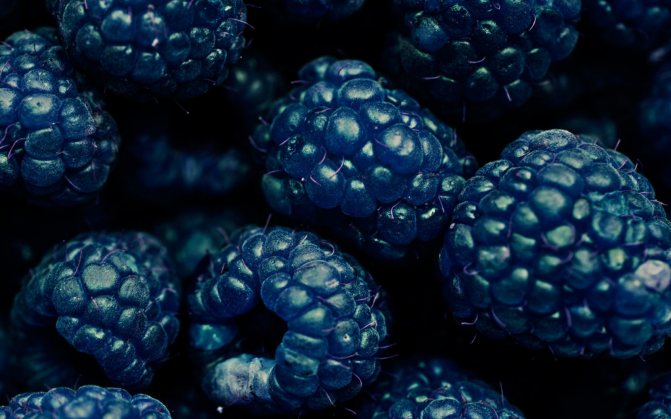
You can try blackberries only if your baby is feeling well.
Allowable amount of blackberries for a nursing mother
The first time you need to try only 3 berries. If the child tolerates the inclusion of new foods well, you can eat 5 pieces. Changes in stool, redness of the skin, swelling on the face will indicate that the body does not accept the new product. If there are no changes, after 3 days you can eat another portion of berries, increasing it by 2 times. Then you can eat healthy berries 3 times a week, 200-300 g.
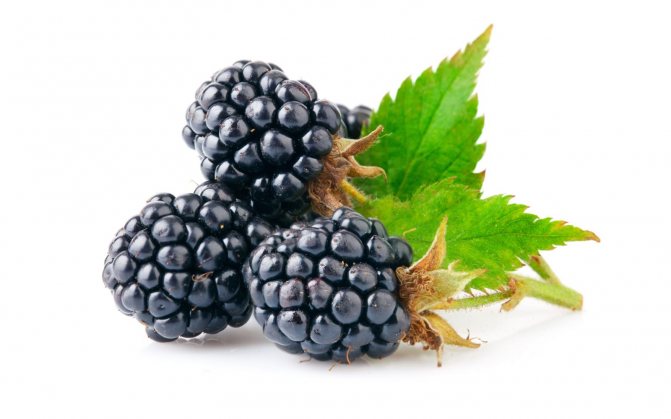
On Mommy's day you can have no more than 3 berries


